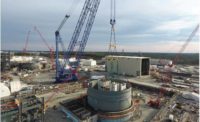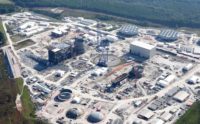Criminal Liability
Utility Executive's Nuclear Project Plea Deal May Strengthen Case Against Ex-CEO

Former SCANA Corp. Senior Vice President Stephen Byrne enters the Matthew J. Perry, Jr. Courthouse in Columbia, S.C. to enter a guilty plea to one count of conspiracy to commit mail and wire fraud Thursday, July 23, 2020. Byrne agreed to cooperate with prosecutors in a federal investigation into the failed V.C. Summer nuclear project in South Carolina.
PHOTO BY AP PHOTO/MICHELLE LIU)
The July 23 announcement of a guilty plea by former SCANA executive Stephen A. Byrne to federal charges of mail and wire fraud related to the failed V.C. Summer nuclear expansion project—along with a pledge to cooperate with federal authorities—sets up a possible day of reckoning for the South Carolina utility’s former CEO Kevin B. Marsh.
Marsh is a co-defendant in the case who still faces charges and Byrne's plea and cooperation could strengthen the case against the chief executive.
A highly detailed complaint by the U.S. Securities & Exchange Commission, filed Feb. 27, alleges that Byrne and Marsh knowingly misled regulators and investor analysts by describing the project’s progress in positive terms, when in fact both men, and others, knew the project was “going up in flames.”
The U.S. Securities & Exchange Commission charged that Byrne and Marsh knowingly misled regulators and investor analysts when they knew the project was “going up in flames.”
By making the alleged false statements, Byrne and Marsh sought to secure rate increases to pay for the work, prosecutors charged.
The SEC’s complaint also details attempts allegedly made by Byrne and Marsh to conceal a report by Bechtel from public scrutiny that had a much gloomier assessment of the project.
U.S. Attorney Peter M. McCoy, Jr. announced the plea agreement with FBI Special Agent Jody Norris, who characterized the conspiracy's goal as one to "enrich a few by robbing families and communities within South Carolina.”
The statement by the U.S. Dept. of Justice noted that around June 2016, Byrne and other SCANA executives conspired to defraud customers with numerous false statements to the South Carolina Public Service Commission, the state Office of Regulatory Staff and the public.
Byrne had testified before the commission that the utility had been presented with several possible final cost scenarios for the project. But prosecutor's claim he was aware in June 2016 that the project’s construction schedule and completion dates were unrealistic and unlikely to be achieved, according to the plea announcement. Both units of the new nuclear project were unlikely to be completed in time to qualify for up to $1.4-billion in federal nuclear production tax credits.
Construction work at the project jobsite in Jenkinsville, S.C., and at remote fabrication sites where modules were created, began in 2013, but work was halted in July 2017 when SCANA abandoned the project without completing either unit. Another new nuclear project, in Georgia, remains under construction but is far overbudget and late.
Also named in the complaint is Dominion Energy, which completed a merger with SCANA Corp. in January 2019. Dominion spokesman Ryan Frazier told ENR that “Dominion Energy continues to cooperate fully with state and federal authorities in this ongoing investigation, pursuant to the terms of the cooperation agreement,” and had no further comment.
Damning Allegations
The SEC’s 87-page complaint, filed Feb. 27 in U.S. District Court in Columbia, S.C., and containing a string of detailed, quote-filled allegations, starts by summarizing that “SCANA and its senior executives repeatedly deceived investors, regulators and the public over several years.”
The SEC’s filing adds depth to the utility executives' intent to deceive. It quotes one SCANA executive who wrote to a colleague that “the failed expansion project at V.C. Summer was due to ‘[e]go and un-attentiveness,’ and that the fallout was ‘[g]onna be a blood letting the likes of which we have never seen.’”
The SCANA executive added: “We ‘got on our jet airplanes and flew around the country showing the same damn construction pictures from different angles and played our fiddles while the whole mf [sic] was going up in flames.’”
As early as April 2015—more than a year before the alleged conspiracy commenced—Byrne and others started becoming aware of major problems with the project, and, soon thereafter, started conspiring to hide the problems from public scrutiny, according to the SEC.
For example, an April 28, 2015 “CEO Talking Points” memo received by Byrne called out contractor Westinghouse for lacking credibility for developing either a realistic schedule or cost estimate. As a result, the memorandum stated further that “The continued failure to meet schedule (Unit 2 now at least 39 months late, and Unit 3 at least 18 months late . . . ) has severely impacted credibility and has placed ongoing regulatory and financial support in jeopardy.”
Just two days later, on April 28, during a first quarter earnings call, Byrne made no mention of these concerns, and maintained that the new units would complete by the respective target dates of June 2019 and June 2020.
Responding to a question from an investor analyst during the call about the risk to production tax credits, Byrne replied: “We believe that … we will actually be qualifying for more production tax credits than we had originally anticipated in our original filing.”
Byrne went on to add that “We fully anticipate that [Westinghouse] will be able to bring the plants in by June of 2019 and June of 2020 for the second unit.”
As a hidden Bechtel report would eventually detail, those dates stood little chance of being achieved.
Hidden Bechtel Report
The SEC’s 2020 legal complaint dedicates a section to the Bechtel-produced project analysis.
In August of 2015, SCANA—notably, “through its counsel,” says the SEC—at a cost of $1 million, hired Bechtel Power Corp. to perform an assessment of the nuclear expansion project.
On Oct. 22, 2015, according to the SEC, Bechtel presented its findings to SCANA, noting that “the current schedule is at risk” and that “[t]o-go scope quantities, installation rates, productivity, and staffing levels all point to completion later than current forecast.”
More precisely, Bechtel’s report indicated that Unit 2’s completion wouldn’t occur until between December 2020 and August 2021—or between 18 and 26 months later than its completion date at the time, which was still June 2019. Unit 3, which was then scheduled to complete by June 2020, most likely couldn’t be completed before June 2022, and as late as June 2023, Bechtel’s analysis projected.
In turn, on Oct. 27—five days after receiving the Bechtel report—SCANA announced a revision in the contractual “Guaranteed Substantial Completion Dates” that added just two months to the units’ completion targets—Aug. 31, 2019 Aug. 31, 2020 for units 2 and 3, respectively.
The Justice Dept.’s plea deal announcement notes that Byrne faces a maximum penalty of five years in federal prison, pending a review of a sentencing report prepared by the United States Probation Office.




